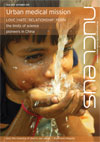Laurence Crutchlow on the challenges of being truthful in medicine.
'to speak the truth, respect privacy and safeguard our patients' confidences'
'What is truth?' Pilate asked Jesus during his trial. Jesus had already answered Pilate saying, 'for this reason I was born, and for this I came into the world, to testify to the truth. Everyone on the side of truth listens to me.' (John 18:37-38). Pilate could not see that he had the very embodiment of truth standing in front of him.
God cannot lie (Titus 1:2). Truth and integrity are a mark of his revelation throughout Scripture, whether in the ninth commandment, or in the Old Testament law. Jesus said 'All you need to say is simply "Yes," or "No"' in the context of talking about oaths (Matthew 5:37), affirmed by James 5:12.
A much fuller treatment of questions around truth in the Bible can be found in my previous article on Integrity in the Easter 2011 edition of Nucleus. 1 There I look at biblical basics, and at some of the trickier situations, such as the actions of the Hebrew midwives in Exodus 1. For this article, I have assumed that readers agree that truth and integrity are essential for the Christian and I will look at how this might work in practice.
At first sight it would appear that we are not out of step with most of the world on this subject. The General Medical Council's (GMC) Good Medical Practice 2 devotes one fifth of its clauses to 'honesty and integrity'. Although the profession clearly sets great store on integrity, perhaps the fact that so much explanation is needed for a subject that we might say ought to be obvious should give pause for thought.
Is telling the truth always right?
Some years ago I travelled with a CMF summer team to Russia to help local CMF students run an evangelistic camp. One extra lecture they arranged was from a Professor of Oncology, who among other things was very clear that patients should not be told about a terminal diagnosis, saying that it left them without hope. Although some students did challenge her, she clearly represented prevailing local opinion. Though such practice might seem out of place in the UK, there are times when I've seen similar things happen. I've never forgotten a patient I looked after as a house officer where her family were adamant that she shouldn't know how severe her metastatic cancer was. She did eventually find out, but not before several difficult discussions with her family. As is so often the case, she was much more aware of how ill she was than her family had realised.
These cases may seem clear cut, but there are times when a patient is very clear that they do not want to know something; which we must respect. We needn't lie to them to respect their wishes; but we should be open, discerning how much they want to know, and phrasing our answers accordingly.
Recent legal changes have introduced a 'duty of candour', enshrining in legislation a longstanding professional obligation to be open and honest with patients if things go wrong. Interestingly, the GMC guidance refers to incidents where harm has occurred to a patient, while the legal duty refers to a 'notifiable patient safety incident'. It is too early to know what effect this might have, but it leaves questions as to whether patients might suffer significant harm in anxiety and worry if staff caring for them feel obliged to tell them about near-misses that actually resulted in no harm.
Questions of truth-telling for students might be much more mundane, but the principles aren't much different. Signing in someone for a lecture they didn't attend is clearly not upholding the truth. But what about the first time we insert a cannula? If we boldly go up to the patient saying 'this is the first time I've ever done this', the chances are that there may never be a first time! But we should say so if asked, ideally ensuring that when performing a procedure on a live patient for the first time, we have someone with us senior enough to ensure the patient is confident and can't come to any harm.
Challenges to confidentiality
The world seems to value confidentiality even more than truth. Doctors are still widely trusted to keep private things private. Even as a first year student, I was amazed at some of the things that patients would tell me, often adding that no-one else knew, sometimes not even their spouse.
Several trends in society present challenges. A first is a trend towards mandatory reporting of certain phenomena by doctors. It has always been recognised that confidentiality isn't absolute. For example, doctors have always been expected to report child abuse to the police, but might have held their counsel about minor concerns over a family. Boundaries seem to have shifted. There is now strong pressure to report any suspicion at all about the welfare of a child. Reporting a child who may be at danger of female genital mutilation is becoming mandatory in law. Society seems to assume that doctors will quickly spot and report all manner of problems.
But each such report means that a patient's confidentiality is broken. This is sometimes entirely reasonable and prevents harm. But what are the long term consequences? Will patients continue to share genuine information with doctors? Will a girl who has undergone FGM overseas dare present to her GP with a serious infection, or will her community ensure that she seeks help elsewhere, from someone who may not have the appropriate skills? There may be no easy answers, but a trend towards diluting confidentiality does have risks, however helpful it may be in specific cases.
Population medicine and the creation of large databases is another challenge. There is clearly much that can be learnt from collating large number of patient records. Such records are usually anonymised. But how much confidence do patients have that their data remains confidential? The media storms over the number of such projects, most recently 'care.data', show that public confidence is low. Since GPs are legally 'data controllers' they bear ultimate responsibility for what happens to patients records.
A less obvious problem is the use of medical records for legal and insurance purposes. I can recall several consultations in which patients have said that they will not answer a question or not discuss a particular aspect of their care because they were concerned that it will cause problems with insurance in future. Of course an insurance company cannot see a patient's record without their permission, but is within its rights to refuse insurance if records are not released.
The GMC states that records should be kept confidential even after a patient's death. But for example if a patient dies in prison, the ombudsman's report into their death will be released in due course. While it will not contain verbatim medical records, there is a surprising amount of detail. A culture of 'freedom of information' will only lead to more such requests.
There may be relatively little we can do about these trends on an individual level, but we can make our feelings known when there are consultations. We can ensure that when we do disclose information because we are required to, that we disclose the minimum necessary to comply with law, and ensure the safety of the patient.
The more mundane challenges to confidentiality are perhaps more applicable now. Who might be sitting behind you in the hospital canteen when you innocently discuss a patient? Does the entire Emergency Department team need to know about the patient with a foreign body in a certain orifice?
More challenging are situations when patients are known to us in some way. It is not that uncommon to end up looking after a colleague who has become unwell. Of course their rights to confidentiality are the same as any others, but we must take extra care to protect them.
Even away from work there may be difficulties. What about when a case that came through the Emergency Department during your placement makes it into the local newspapers, and people ask you about it? Your duty to the patient remains the same.
I've found it not uncommon to have conversations with friends who tell me more about medical problems than they would other friends because they know what work I do. Even though there is no formal professional relationship (and they are often not directly seeking advice), I have thought it wise to treat such conversations as if they had occurred at work, and keep them confidential.
Conclusions
It is clear just from the few scenarios that I've suggested here, that neither integrity or confidentiality are quite as simple as they might first seem. The medical profession very widely recognises these things as important, so it is easy to fall into a culture of fitting in with what everyone around us is doing, as most of the time it appears acceptable. But we must remember that society changes; we can't be sure that there will always be respect for truth and confidentiality in the profession, nor that we won't come under pressure to conform when boundaries are pushed.
For the Christian, truth is not just GMC guidance, or even just a part of our value system. It is a reflection of the God we worship. Our commitment to integrity should show others something of God's character as we study and work with them. We need to pray for the Holy Spirit's work in us to enable this to happen.
































